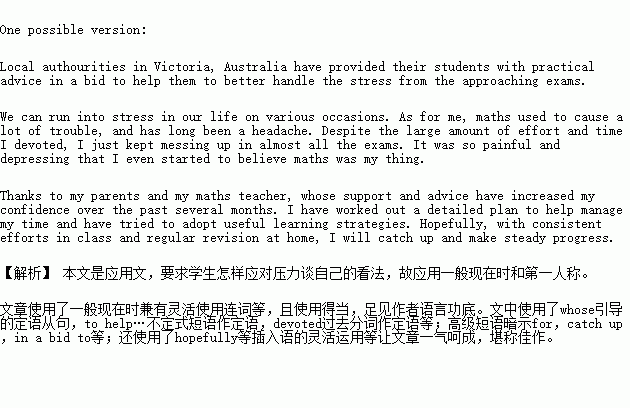题目内容
阅读下面短文, 然后按照要求写一篇150词左右的英语短文。
High school students in Victoria, Australia have been offered Education Department advice ahead of their written exams. The advice has been developed by the state Education Department together with a mental health organization. “Exams can be a stressful time and the government is ensuring that students have the support they need to get through the period,” Education Minister Martin Dixon said.
Students are advised to breathe deeply through their noses as a relaxation technique, to have a healthy diet, and to improve their mood by exercising. The importance of sleep, staying connected with family and friends, and planned study times are emphasized. Students will also learn “positive self-talk”. “The positive way that you talk to yourself can be used for greater confidence and reducing stress, and can be a very effective way to prepare yourself for a big test or exam,” students are told.
The tips encourage young people to speak up if they are having difficulty, and remember that life will go on beyond exams. At the same time, students with serious problems are urged to seek professional help.
写作内容:1.用约30个单词写出上文概要;
2.用约120个单词对文中所述话题进行讨论, 内容包括:
3.你学习或生活中面对怎样的压力;
4.你正在或打算如何应对这些压力。
写作要求:
1.作文中可以使用自己的亲身经历或虚构的故事, 也可以参照阅读材料的内容, 但不得 直接引用原文中的句子;
2.文中不能出现真实姓名和学校名称;
3.不必写标题。
 名校课堂系列答案
名校课堂系列答案Escape from FoMO
Here’s a test you might enjoy: rate these situations on a number scale, ranging from 1 for mild discomfort to 7 for unbearable distress.
Situation 1: you’re visiting New York City and realize there’s no way you’ll be able to get to all the exhibits, see all the recommended plays or take in even part of the “musts”. How do you feel now? Something like 5?
Situation 2: you’re at dinner with friends, and you’ve all agreed to make it a strictly phone-free evening. But your smartphone won’t stop keeping Twitter and text alerts. Something is obviously up in your social network, but you can’t check. Even 7 wouldn’t match the stress you’re feeling now.
Welcome to FoMO (Fear of Missing Out), the latest mental disorder caused by social media connections sharing updates that leaves individuals feeling that they are missing out on something more exciting, important, or interesting going on somewhere else. It is an outcome of technological advancement and booming social information. According to a recent study, 56 per cent of those who use social networks suffer this.
It is not uncommon that at night when you’ve sworn again to put the phone aside or turn off the computer, you cast one last glance at the screen on your way to bed in case you miss some titbit (趣闻)supplied by mere acquaintances or even strangers’ requesting your “friendship”.
We all know the studies showing that end-of-life regrets centre on what we didn’t do, rather than on what we did. If so, constantly watching others doing things that we are not is rich ground for a future of looking back in sorrow. Attractive online images—so charming from afar—make FoMO more destructive. Technology has become the major construct through which we define intimacy (亲密).You may look on in wonder as someone taps out an endless text message instead of actually talking to the person they’re with. Being connected to everyone, all the time, is a new human experience; we’re just not equipped to cope with it yet.
Researchers say our dependence on technology can be reduced if we manage to separate ourselves, even for short periods of time, from our gadgets. However, the problem can only be settled when we grasp that our brains and our humanity—not our technologies—enable this addiction. We cannot seek solutions without honestly asking ourselves why we are so afraid of missing out. Researchers find FoMO occurs mostly in people with unfulfilled psychological needs in fields such as love, respect and security. FoMO levels are highest in young people, in particular young men.
What, then, can we do about something so damaging to our quality of life? The best way to cope with FoMO is to recognize that, at our fast-paced life, we are sometimes bound to miss out. Instead of trying to maximize our benefits, we seek a merely “good enough” result. If you still doubt that“good enough” is the best cure for FoMO, the words of the American essayist and poet Ralph Waldo Emerson might strike the right chord,“For everything you have missed, you have gained something else, and for everything you gain, you lose something else.”
Escape from FoMO
Main Points | Details |
Concept of FoMO | FoMO, constantly 1. our peace of mind, refers to the unease of feeling that we are not part of social connection. |
Examples of FoMO | • When having dinner with friends, we feel extremely depressed when 2. to check our social network. • Determined as we are to put aside phones, we can’t shift our (73) from them until we go to bed. |
3. behind FoMO | • Technology develops and social information explodes. • Images of online friends 4. more to us, compared to our real world friends. • Some of us attempt to feel5.A fulfilled on social network. |
Bad effects of FoMO | • We are constantly6. for things that we didn’t do. • Communicating with friends in the virtual world gives7. to the decline of important relationships with friends and family. |
Suggestions on avoiding FoMo | • Get (8. from the modern technology. • Recognize that missing out is part of our life. • Accept that9.can sometimes be “a blessing in disguise”. |

